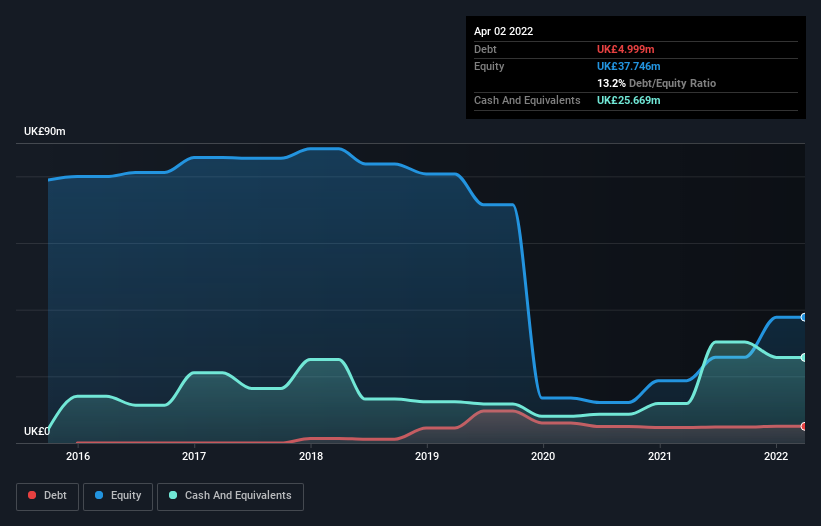We Think Mulberry Group (LON:MUL) Can Manage Its Debt With Ease
Warren Buffett famously said, 'Volatility is far from synonymous with risk.' It's only natural to consider a company's balance sheet when you examine how risky it is, since debt is often involved when a business collapses. We can see that Mulberry Group plc (LON:MUL) does use debt in its business. But the more important question is: how much risk is that debt creating?
What Risk Does Debt Bring?
Debt and other liabilities become risky for a business when it cannot easily fulfill those obligations, either with free cash flow or by raising capital at an attractive price. Part and parcel of capitalism is the process of 'creative destruction' where failed businesses are mercilessly liquidated by their bankers. While that is not too common, we often do see indebted companies permanently diluting shareholders because lenders force them to raise capital at a distressed price. Of course, plenty of companies use debt to fund growth, without any negative consequences. When we think about a company's use of debt, we first look at cash and debt together.
View our latest analysis for Mulberry Group
How Much Debt Does Mulberry Group Carry?
You can click the graphic below for the historical numbers, but it shows that as of April 2022 Mulberry Group had UK£5.00m of debt, an increase on UK£4.67m, over one year. But it also has UK£25.7m in cash to offset that, meaning it has UK£20.7m net cash.
A Look At Mulberry Group's Liabilities
According to the last reported balance sheet, Mulberry Group had liabilities of UK£41.7m due within 12 months, and liabilities of UK£54.3m due beyond 12 months. Offsetting these obligations, it had cash of UK£25.7m as well as receivables valued at UK£15.9m due within 12 months. So its liabilities outweigh the sum of its cash and (near-term) receivables by UK£54.4m.
This deficit isn't so bad because Mulberry Group is worth UK£179.6m, and thus could probably raise enough capital to shore up its balance sheet, if the need arose. But it's clear that we should definitely closely examine whether it can manage its debt without dilution. While it does have liabilities worth noting, Mulberry Group also has more cash than debt, so we're pretty confident it can manage its debt safely.
Notably, Mulberry Group's EBIT launched higher than Elon Musk, gaining a whopping 201% on last year. There's no doubt that we learn most about debt from the balance sheet. But you can't view debt in total isolation; since Mulberry Group will need earnings to service that debt. So if you're keen to discover more about its earnings, it might be worth checking out this graph of its long term earnings trend.
Finally, a company can only pay off debt with cold hard cash, not accounting profits. Mulberry Group may have net cash on the balance sheet, but it is still interesting to look at how well the business converts its earnings before interest and tax (EBIT) to free cash flow, because that will influence both its need for, and its capacity to manage debt. Over the last two years, Mulberry Group actually produced more free cash flow than EBIT. That sort of strong cash generation warms our hearts like a puppy in a bumblebee suit.
Summing up
While Mulberry Group does have more liabilities than liquid assets, it also has net cash of UK£20.7m. And it impressed us with free cash flow of UK£27m, being 169% of its EBIT. So is Mulberry Group's debt a risk? It doesn't seem so to us. The balance sheet is clearly the area to focus on when you are analysing debt. But ultimately, every company can contain risks that exist outside of the balance sheet. These risks can be hard to spot. Every company has them, and we've spotted 1 warning sign for Mulberry Group you should know about.
If you're interested in investing in businesses that can grow profits without the burden of debt, then check out this free list of growing businesses that have net cash on the balance sheet.
Have feedback on this article? Concerned about the content? Get in touch with us directly. Alternatively, email editorial-team (at) simplywallst.com.
This article by Simply Wall St is general in nature. We provide commentary based on historical data and analyst forecasts only using an unbiased methodology and our articles are not intended to be financial advice. It does not constitute a recommendation to buy or sell any stock, and does not take account of your objectives, or your financial situation. We aim to bring you long-term focused analysis driven by fundamental data. Note that our analysis may not factor in the latest price-sensitive company announcements or qualitative material. Simply Wall St has no position in any stocks mentioned.
Join A Paid User Research Session
You’ll receive a US$30 Amazon Gift card for 1 hour of your time while helping us build better investing tools for the individual investors like yourself. Sign up here

 Yahoo Finance
Yahoo Finance 
